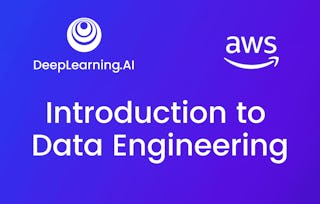Start your journey in one of the fastest growing professions today with this beginner-friendly Data Engineering course! You will be introduced to the core concepts, processes, and tools you need to know in order to get a foundational knowledge of data engineering. as well as the roles that Data Engineers, Data Scientists, and Data Analysts play in the ecosystem.

Introduction to Data Engineering

Introduction to Data Engineering
This course is part of multiple programs.


Instructors: Rav Ahuja
248,327 already enrolled
Included with
(3,577 reviews)
Recommended experience
What you'll learn
List basic skills required for an entry-level data engineering role.
Discuss various stages and concepts in the data engineering lifecycle.
Describe data engineering technologies such as Relational Databases, NoSQL Data Stores, and Big Data Engines.
Summarize concepts in data security, governance, and compliance.
Skills you'll gain
Details to know

Add to your LinkedIn profile
See how employees at top companies are mastering in-demand skills

Build your subject-matter expertise
- Learn new concepts from industry experts
- Gain a foundational understanding of a subject or tool
- Develop job-relevant skills with hands-on projects
- Earn a shareable career certificate

There are 4 modules in this course
In this module, you will learn about the different entities that come together to form a modern data ecosystem and the role Data Engineers, Data Scientists, Data Analysts, Business Analysts, and Business Intelligence Analysts play in this ecosystem. You will learn what data engineering is and the key tasks in a data engineering lifecycle. You will also gain an understanding of the responsibilities of a data engineer, the skillsets they need in order to be successful, and what a typical day in the life of a data engineer looks like.
What's included
10 videos2 readings4 assignments
In this module, you will learn about the data engineering ecosystem, the different types of data structures, file formats, sources of data, and the languages data professionals use in their day-to-day tasks. You will gain an understanding of several different types of data repositories such as relational and non-relational databases, data warehouses, data marts, and data lakes. You will learn about ETL and ELT processes, data pipelines, and data integration platforms. You will also gain an understanding of what big data is, and the tools used for processing and storing big data. At the end of this module, you will be guided to create an IBM Cloud account, and provision an instance of IBM Db2.
What's included
18 videos4 readings6 assignments1 app item3 plugins
In this module, we will walk you through the data engineering lifecycle. You will learn about the architecture of a data platform, factors for selecting and designing data stores, and the different facets of security as it applies to data platforms and data lifecycle management. You will also learn about the process, steps, and tools used for gathering, importing, wrangling, and querying data. You will gain an understanding of performance monitoring and the steps you can take to troubleshoot performance issues. We will also talk about governance regulations, why we need them, and how technology enables compliance to regulations. During the course of this module, you will be guided to load data from a CSV file into the IBM Db2 instance you created in the previous module. You will also be guided to explore your dataset using some basic SQL queries that will be provided to you.
What's included
10 videos5 readings8 assignments2 app items2 plugins
In this module, you will learn about career opportunities in the field of Data Engineering and the different paths that you can take for getting skilled as a Data Engineer. At the end of the module, you will be presented with the final graded assignment which is divided into two parts. The first part consists of a set of quiz questions, and the second part includes open-ended questions that will be reviewed and graded by a peer or through an AI-graded, auto-scored assignment.
What's included
6 videos2 readings3 assignments1 peer review1 app item3 plugins
Earn a career certificate
Add this credential to your LinkedIn profile, resume, or CV. Share it on social media and in your performance review.
Explore more from Data Management
 Status: Free Trial
Status: Free TrialDeepLearning.AI
 Status: Free Trial
Status: Free Trial Status: Free Trial
Status: Free Trial Status: Free Trial
Status: Free Trial
Why people choose Coursera for their career

Felipe M.

Jennifer J.

Larry W.

Chaitanya A.
Learner reviews
- 5 stars
79.76%
- 4 stars
16.49%
- 3 stars
2.34%
- 2 stars
0.41%
- 1 star
0.97%
Showing 3 of 3577
Reviewed on Apr 7, 2024
Very good introduction to Data Engineering. Not too technical, but a very good foundation of both technical concepts and soft skills required in becoming a successful data engineer.
Reviewed on Aug 13, 2024
A very good introduction course. It presents all ecosystem of Data Engineering, the fields of works and specific areas related to ir and also all its technologies and applications.
Reviewed on Mar 25, 2022
This course is optimal for the foundations and understanding of Data Engineering. Please take it and absorb all the knowledge and be amazed about your future with the Data Engineer certification.

Open new doors with Coursera Plus
Unlimited access to 10,000+ world-class courses, hands-on projects, and job-ready certificate programs - all included in your subscription
Advance your career with an online degree
Earn a degree from world-class universities - 100% online
Join over 3,400 global companies that choose Coursera for Business
Upskill your employees to excel in the digital economy
Frequently asked questions
To access the course materials, assignments and to earn a Certificate, you will need to purchase the Certificate experience when you enroll in a course. You can try a Free Trial instead, or apply for Financial Aid. The course may offer 'Full Course, No Certificate' instead. This option lets you see all course materials, submit required assessments, and get a final grade. This also means that you will not be able to purchase a Certificate experience.
When you enroll in the course, you get access to all of the courses in the Certificate, and you earn a certificate when you complete the work. Your electronic Certificate will be added to your Accomplishments page - from there, you can print your Certificate or add it to your LinkedIn profile.
More questions
Financial aid available,
¹ Some assignments in this course are AI-graded. For these assignments, your data will be used in accordance with Coursera's Privacy Notice.

